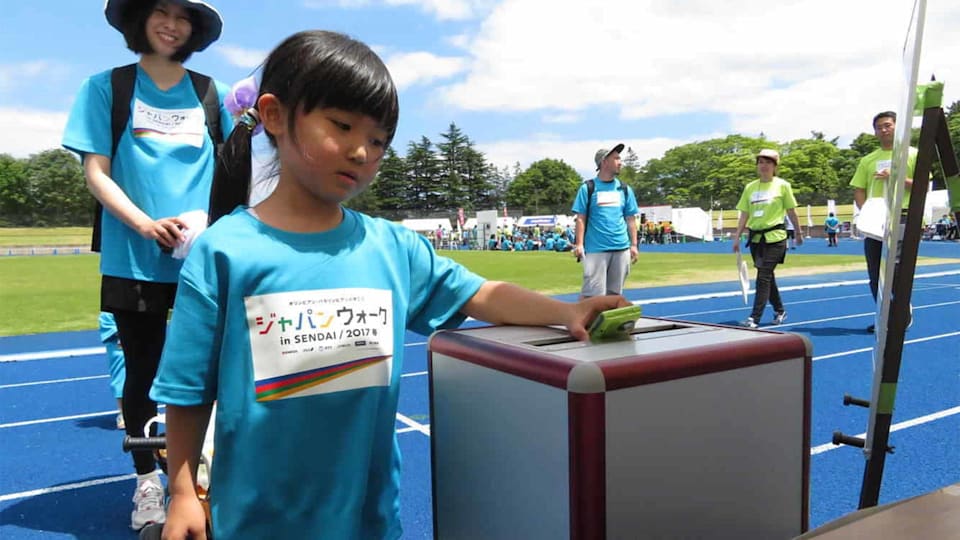Tokyo 2020 reveals progress on sustainability
From recycling electronic devices into Olympic medals to reducing and offsetting CO2 emissions and promoting human rights, the Tokyo 2020 Sustainability Progress Report highlights substantial progress made towards the delivery of Tokyo 2020 Sustainability Plan.

Version two of the Sustainability Plan was published in June 2018 under the guiding principle of “Be better, together – For the planet and the people.” The Progress Report details achievements to date in the areas of climate change, resource management, the natural environment and biodiversity, human rights, labour and fair business practices, as well as involvement, cooperation and communications. It was published in accordance with the Global Reporting Initiative (GRI) Standards Core Option – a set of international standards governing sustainability reporting.
Tokyo 2020 CEO Toshiro Muto commented, “With about one year and four months left until the Games, the year 2019 will see Tokyo 2020 undergo a sea change as we transition from the planning phase to the operations phase, which will entail a shift in focus to the respective Games competition venues. This year will be extremely important in our efforts to ensure that sustainability is given adequate consideration. All members of Tokyo 2020 will work as one to cultivate a deeper awareness of their respective roles and ensure that sustainability is incorporated into all of our activities as we look toward 2020 and beyond.”
Key activities and achievements to date include:
- The Tokyo 2020 Medal Project, which aims to produce the Olympic and Paralympic medals from recycled electronic devices, is close to hitting its target. By October 2018, approximately 47,488 tons of discarded devices and over 5 million used mobile phones had been collected, with 93.7 per cent of the targeted amount of gold, 85.4 per cent of the silver and 100 per cent of the bronze already sourced. The project has generated significant public engagement in Japan and internationally. More than 18,000 collection boxes have been installed across the country, and approximately 90 per cent of Japan’s local authorities have participated. The collections are due to be finalised on 31 March 2019.
- Sixty-three municipalities across Japan have joined Operation BATON – Building Athletes’ village with Timber Of the Nation. The project aims to construct the Olympic village using sustainably-sourced Japanese timber donated by local authorities across Japan. After the Games, the timber will be returned for re-use by local communities – for example as public benches or as part of school buildings.
- A Carbon Offset Programme has been put in place to offset unavoidable CO2 emissions, in collaboration with the Tokyo Metropolitan Government. Tokyo 2020 is also encouraging citizens’ participation in activities to reduce and absorb their CO2 emissions. In December 2018, Tokyo 2020 was one of the first signatories of the UN Sports for Climate Action Initiative, in which the IOC has taken a leadership role. The aim of the initiative is to drive climate action across the sports community.
- In addition to the Sustainable Sourcing Code, which governs the overall procurement for the Tokyo 2020 Games, supplementary criteria for the sourcing of paper and palm oil were established in 2018 to help ensure sustainable sourcing for these items. A grievance mechanism was also put in place to handle reports of non-compliance and to enhance the overall effectiveness of the Code.
- Tokyo 2020 has also promoted the reuse and recycling of procured items, established rules governing asset management and disposal, and ensured more efficient procurement of resources by means such as leasing.
- Through its collaboration with the International Labour Organisation (ILO) and the United Nations, Tokyo 2020 has been supporting collective efforts and initiatives aimed at advancing the UN Sustainable Development Goals. As an example, the Sustainability Forum, hosted jointly by Tokyo 2020 and the ILO in October 2018, provided an opportunity to discuss supply chain management and human rights due dilligence with corporate sponsors, while encouraging corporate commitment to promote responsible labour practices.
- Energy-saving measures have been put in place, and renewable energy technology has been installed at the new permanent venues being built.
- To ensure respect for the human rights of all people involved in the preparation and delivery of the Games, Tokyo 2020 has supported awareness-raising and training activities on diversity and inclusion among its own staff, and implemented its own Diversity & Inclusion Strategy and provided a range of awareness training opportunities.
“We are pleased to see that sustainability has such a central place in the delivery of the Olympic Games Tokyo 2020, and that so much progress has already been made to turn this commitment into reality,” said Michelle Lemaitre, IOC Head of Sustainability. “The initiatives undertaken by Tokyo 2020 cover a wide spectrum of key areas of sustainability, and show a great deal of innovation and creativity. We look forward to our continued cooperation with the Organising Committee to help the Olympic Games Tokyo 2020 become a truly sustainable event, following the recommendations of Olympic Agenda 2020.”
In line with Olympic Agenda 2020 – the strategic roadmap for the future of the Olympic Movement – the IOC is engaging with the Organising Committees to ensure that sustainability principles are included in all aspects of the planning and staging of the Olympic Games. To this end, the IOC has been working closely with the Tokyo 2020 Organising Committee, offering guidance, tools and mechanisms in support of the delivery of the Tokyo 2020 Sustainability Plan.